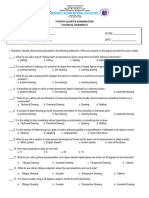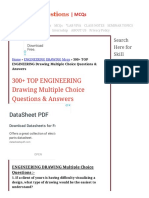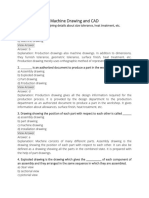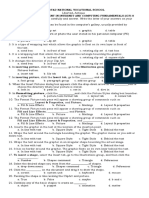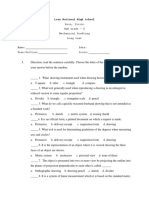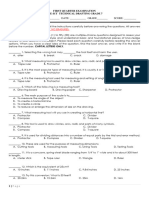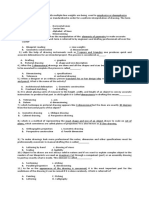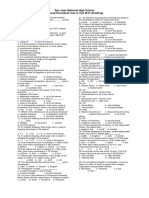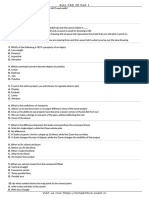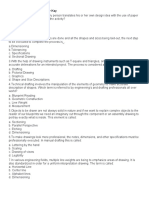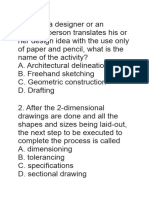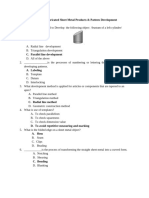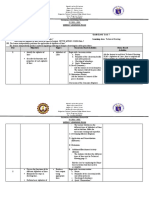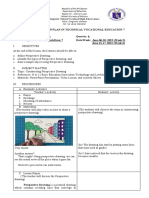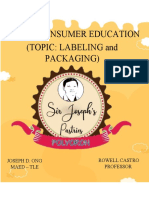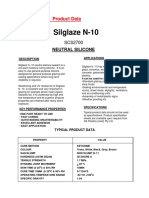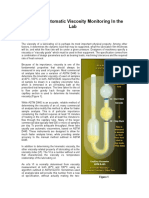0 ratings0% found this document useful (0 votes)
71 viewsGr.8 Techdraw 1st Summative
Gr.8 Techdraw 1st Summative
Uploaded by
JOSEPH ONGThis document is a test on technical drawing concepts taken by a student at Guiguinto National Vocational High School-Annex. It consists of 35 multiple choice questions testing knowledge of topics like orthographic drawings, assembly drawings, exploded views, and isometric projections. The test also includes instructions for the student to construct an isometric drawing based on given orthographic views. It was prepared by a technical drawing teacher and approved by the school administration.
Copyright:
© All Rights Reserved
Available Formats
Download as DOCX, PDF, TXT or read online from Scribd
Gr.8 Techdraw 1st Summative
Gr.8 Techdraw 1st Summative
Uploaded by
JOSEPH ONG0 ratings0% found this document useful (0 votes)
71 views2 pagesThis document is a test on technical drawing concepts taken by a student at Guiguinto National Vocational High School-Annex. It consists of 35 multiple choice questions testing knowledge of topics like orthographic drawings, assembly drawings, exploded views, and isometric projections. The test also includes instructions for the student to construct an isometric drawing based on given orthographic views. It was prepared by a technical drawing teacher and approved by the school administration.
Original Title
Gr.8 Techdraw 1st summative (2)
Copyright
© © All Rights Reserved
Available Formats
DOCX, PDF, TXT or read online from Scribd
Share this document
Did you find this document useful?
Is this content inappropriate?
This document is a test on technical drawing concepts taken by a student at Guiguinto National Vocational High School-Annex. It consists of 35 multiple choice questions testing knowledge of topics like orthographic drawings, assembly drawings, exploded views, and isometric projections. The test also includes instructions for the student to construct an isometric drawing based on given orthographic views. It was prepared by a technical drawing teacher and approved by the school administration.
Copyright:
© All Rights Reserved
Available Formats
Download as DOCX, PDF, TXT or read online from Scribd
Download as docx, pdf, or txt
0 ratings0% found this document useful (0 votes)
71 views2 pagesGr.8 Techdraw 1st Summative
Gr.8 Techdraw 1st Summative
Uploaded by
JOSEPH ONGThis document is a test on technical drawing concepts taken by a student at Guiguinto National Vocational High School-Annex. It consists of 35 multiple choice questions testing knowledge of topics like orthographic drawings, assembly drawings, exploded views, and isometric projections. The test also includes instructions for the student to construct an isometric drawing based on given orthographic views. It was prepared by a technical drawing teacher and approved by the school administration.
Copyright:
© All Rights Reserved
Available Formats
Download as DOCX, PDF, TXT or read online from Scribd
Download as docx, pdf, or txt
You are on page 1of 2
Guiguinto National Vocational High School-Annex
Malis, Guiguinto, Bulacan
1st Summative Test in Technical Drawing 8
NAME: ___________________________________________________________ SCORE: _________________
SECTION: ________________________________________________________ DATE: ___________________
PART I
Directions: Read each item carefully and choose
your best answer. Encircle the letter of the 11. Exploded isometrics are commonly referred
correct answer. to as________.
a. Assembly drawing c. Pictorial drawing
1. It is usually an orthographic drawing of an b. Axonometric drawing d. Working Drawing
object with its parts assembled. 12. Exploded isometric drawings are often used
a. Assembly drawing c. Layout assembly in technical manuals to show all the parts of a
b. General assembly d. Working assembly product and how they fit together.
2. It is a two-view or three-view drawing of the a. False c. True
whole object. b. Maybe d. Either A or B
a. Assembly drawing c. Layout assembly 13.A method of graphic represented of three-
b. General assembly d. Working assembly dimensional objects, used by engineers.
3. This drawing shows rough preliminary design a. Dimetric c. Oblique
ideas sometimes in sketch form. b. Isometric d.Trimetric
a. Assembly drawing c. Layout assembly 14. An Isometric obect should be drawn using
b. General assembly d. Working assembly vertical lines and ______ lines.
4. It includes orthographic drawings, a. Curved c. Inclined
dimensions, and notes or lettering. b. Horizontal d. Vertical
a. Assembly drawing c. Layout assembly 15. Angle between all the three axes must be
b. General assembly d. Working assembly _____ degrees.
5. This gives general information about a a. 90 c. 180
machine or a group of components.. b. 120 d. 360
a. Exploded Pictorial c. Outline Assembly 16. A drawing instrument to be used in
b. Diagram Assembly d. Pictorial Assembly constructing isometric drawing.
6. The drawing with a set of instructions in a. Compass c. Scale
words and/or an annotated(labeled) picture that b. Protractor d. Triangle
explain in detail how we must assemble an item. 17. The angle of the cross axis is ____from the
a. Exploded Pictorial c. Outline Assembly low lower edge of the paper.
b. Diagram Assembly d. Pictorial Assembly a. 15 degree c. 45 degree
7. This are drawings used to show how b. 30 degree d. 90 degree
individual components fit together. 18. Isometric projection is a type of an________.
a. Exploded Pictorial c. Outline Assembly a. assembly c. perspective
b. Diagram Assembly d. Pictorial Assembly b. axonometric d. working
8. This is usually drawn in pictorial form with an 19. ________ lines are drawn at 30 degree angle
axis line showing the sequence of assembly. to to the horizontal plane.
a. Exploded Pictorial c. Outline Assembly a. Curved c. Inclined
b. Diagram Assembly d. Pictorial b. Horizontal d. Isometric
Assembly 20. Isometric drawing, also called ___ projection.
9. It is the detailed measurements required for a. Dimetric c. Oblique
manufacturer are excluded from assembly b. Isometric d. Trimetric
drawing. 21. A pictorial drawing in which the front
a. Dimension c. Layout Assembly plane is parallel to the plane of projection.
b. General Assembly d. Parts list a. Isometric c. Orthographic
10. This refers to each part given a unique b. Oblique d. Perspective
number placed in a circle. A leader line22. 22. This type of oblique drawing is drawn in
terminates to part of the object. its actual measurement.
a. Assembly Drawing c. Layout Assembly a. Cabinet oblique c. Oblique
b. General Assembly d. Parts list b. Cavalier oblique d. Perspective
23. The cross-axis of cavalier oblique is____.
a. 30 degree c. 60 degree PART II
b. 45 degree d. 90 degree Directions: Study the given Orthographic Drawing
24. The type of oblique drawing wherein the below then CONSTRUCT THE ISOMETRIC
width of objects is reduced by half of its size. DRAWING of it in a LONG BOND PAPER. All
a. Cabinet oblique c. Oblique dimensions are IN CENTIMETER. (15 POINTS)
b. Cavalier oblique d. Perspective
25. The cross- axis of cabinet oblique is _______.
a. 30 degree c. 60 degree
b. 45 degree d. 90 degree
26. The method used in drawing isometric circle or
ellipse drawing.
a. Five- center Approximation
b. Four- center Approximation
c. Six- center Approximation
d. Twelve- center Approximation
27. A closed curve in the form of a symmetrical oval.
a. cube c. ellipse
b. cylinder d. square
28. Which tool is NOT used in constructing isometric circle
Circle or ellipse drawing?
a. Compass c. Triangle
b. Protractor d. T-square
29. Isometric circles are drawn by drawing first the
isometric _____which surrounds the given circle.
a. Cube c. Ellipse
b. Cylinder d. Square
30. Which triangle is used in constructing isometric circle
or ellipse drawing?
a. 30x60 degree c. 30x90 degree
b. 45x45 degree d. 45x90 degree
31. The acronym BOM in drafting technology stands
for ______________.
a. Bill of Materials c. Balance of Measurement
b. Base of the Machine d. Bill of Manager
32. The following are the benefits from assembly
drawing.
a. Helpful to the assemblers Prepared by:
b. Faster CAD Design
c. Easier job parts of fixture JOSEPH D. ONG
d. all of the above Subject Teacher
33. A unit assembled separately but designed to
be incorporated with other units into a larger Recommending Approval:
manufactured product.
a. Sub-assembly c. Assembly URIAH- ZOE C. RAYMUNDO
b. Disassembly d. Connecting TVE Coordinator
34. Drawing that shows the relationship of two or
more parts of an item when assembled. Verified & Approved:
a. Sub-assembly c. Assembly
b. Disassembly d. Connecting DAISY DJ. MIRANDA
35. The action of fitting together the component Assistant School Principal II/ OIC
parts of a machine or other objects.
a. Sub-assembly c. Assembly __________________________________
b. Disassembly d. Connecting PARENT’S SIGNATURE
You might also like
- Solid Edge Associate Level Certification Sample ExaminationweqrDocument9 pagesSolid Edge Associate Level Certification Sample ExaminationweqrROng Rin100% (3)
- Blueprint Reading For Welders 9th Edition Bennett Test BankDocument4 pagesBlueprint Reading For Welders 9th Edition Bennett Test BankMrsKellyHammonddqnya100% (12)
- Drafting - Test Questions Tle 10Document4 pagesDrafting - Test Questions Tle 10VanAnne100% (10)
- Manual NSFC01-01A - NingboDocument20 pagesManual NSFC01-01A - NingboPablo Nobati100% (8)
- Engineering Drawing Multiple Choice QuestionDocument7 pagesEngineering Drawing Multiple Choice Questionlogicvirus62% (29)
- Technical Drawing Grade 8 1Document39 pagesTechnical Drawing Grade 8 1JOHN DANIEL LABARADOR100% (11)
- Performs Basic Exploded Assembly DrawingsDocument22 pagesPerforms Basic Exploded Assembly DrawingsJOSEPH ONGNo ratings yet
- Question Database For Exams Problems OnlyDocument41 pagesQuestion Database For Exams Problems OnlyLooser PakerNo ratings yet
- Technical Drawing Past QuestionsDocument52 pagesTechnical Drawing Past QuestionsPst Felix100% (8)
- Diagnostic Test Technical DraftingDocument4 pagesDiagnostic Test Technical DraftingKRIZZIE JOY CAILING100% (3)
- Sorrow and SufferingsDocument63 pagesSorrow and Sufferingswww.alhassanain.org.englishNo ratings yet
- Basic Technical Drawing ExamDocument2 pagesBasic Technical Drawing ExamSisay GaromaNo ratings yet
- Drafting Test Questions Tle 10Document4 pagesDrafting Test Questions Tle 10christian paulNo ratings yet
- Work SheetDocument12 pagesWork SheetMolla DerbewNo ratings yet
- Practice Questions GraphicsijDocument18 pagesPractice Questions Graphicsijsamer07hdNo ratings yet
- Diagnostic Examination in Drafting - LONGDocument4 pagesDiagnostic Examination in Drafting - LONGMark Martin MejiaNo ratings yet
- 8 TD TestDocument3 pages8 TD TestJeff CanalejaNo ratings yet
- Tle 1Document8 pagesTle 1Spare Man100% (1)
- 300+ TOP ENGINEERING Drawing Multiple Choice Questions & Answers HhajsbsiDocument17 pages300+ TOP ENGINEERING Drawing Multiple Choice Questions & Answers HhajsbsiANWAAR HUSSAIN100% (2)
- Soalan Objectif Basic Technical DrawingDocument5 pagesSoalan Objectif Basic Technical Drawinghazreen othmanNo ratings yet
- 1 MarksDocument33 pages1 MarksSri RamNo ratings yet
- Machine Drawing and CADDocument84 pagesMachine Drawing and CADDhananjay KadamNo ratings yet
- First Quarter Drafting Summative TestDocument3 pagesFirst Quarter Drafting Summative Testkarenmae.campomanesNo ratings yet
- 3rd QUARTERLY ASSESSMENT IN ICF8Document2 pages3rd QUARTERLY ASSESSMENT IN ICF8Denmark FranciscoNo ratings yet
- DATE: October - , 2019: Choose and Circle The Letter of The Correct Answer in Each ItemDocument3 pagesDATE: October - , 2019: Choose and Circle The Letter of The Correct Answer in Each ItemNefritiri BlanceNo ratings yet
- Engineering Drawing MCQSDocument11 pagesEngineering Drawing MCQSTaimur AbdullahNo ratings yet
- Mcq-On Catia: 1. What Is The Colour of Under-Constrained Elements in CATIA SketcherDocument15 pagesMcq-On Catia: 1. What Is The Colour of Under-Constrained Elements in CATIA SketcherRupesh Kamat100% (1)
- OralDocument4 pagesOralCherry May AbingNo ratings yet
- TT Model Question PaperDocument3 pagesTT Model Question PaperDijesh PunathilNo ratings yet
- Machine Drawing ExamDocument11 pagesMachine Drawing ExamMolla DerbewNo ratings yet
- Cad MCQ 1Document4 pagesCad MCQ 1Vikram RathoreNo ratings yet
- Cad Final (Mark Jay Arcega Bset 1a)Document11 pagesCad Final (Mark Jay Arcega Bset 1a)Blank GamingNo ratings yet
- Catia Multiple Choice Q&aDocument9 pagesCatia Multiple Choice Q&agopichandallakaNo ratings yet
- Summative Grade 8Document1 pageSummative Grade 8christian paul60% (5)
- Second Periodical Test TLE VIII - Technical Drafting (Exploratory)Document5 pagesSecond Periodical Test TLE VIII - Technical Drafting (Exploratory)Krizzie Jade CailingNo ratings yet
- 53 DRG Basics Quiz With AnswersDocument2 pages53 DRG Basics Quiz With Answersalankar2050No ratings yet
- Leon, Iloilo TLE Grade - 8 Mechanical Drafting Long Test: Leon National High SchoolDocument3 pagesLeon, Iloilo TLE Grade - 8 Mechanical Drafting Long Test: Leon National High Schoolchristian paulNo ratings yet
- technical drawing nesamDocument10 pagestechnical drawing nesam5ciezzerNo ratings yet
- AutoCAD QUIZBANKDocument11 pagesAutoCAD QUIZBANKZan OjedaNo ratings yet
- 4th PT TLE ICT TDDocument2 pages4th PT TLE ICT TDJeffrey MacalinoNo ratings yet
- Comp AppDocument101 pagesComp AppRamon Villanueva Jr.No ratings yet
- q1 Technical Drafting Grade 7Document4 pagesq1 Technical Drafting Grade 7Dudes CoolNo ratings yet
- REVIEWDocument10 pagesREVIEWWarda MamasalagatNo ratings yet
- Answer: Option ADocument28 pagesAnswer: Option ADhananjay KadamNo ratings yet
- G8Drafting-Prelim. ExamDONEDocument2 pagesG8Drafting-Prelim. ExamDONEJerry LustreNo ratings yet
- Drafting Periodical TestDocument2 pagesDrafting Periodical TestDensel James Abua Silvania100% (1)
- Day 4 - Drafting Area Answer KeysDocument16 pagesDay 4 - Drafting Area Answer KeysRodriguez, Mary Grace D.No ratings yet
- JuVzr7dTmeaYZin6sGuT - Auto CAD 2D Part 1 50 MCQ CEXAMINDIADocument7 pagesJuVzr7dTmeaYZin6sGuT - Auto CAD 2D Part 1 50 MCQ CEXAMINDIAAbhilash RawatNo ratings yet
- Day 4 - Drafting AreaDocument16 pagesDay 4 - Drafting AreathisischerubyNo ratings yet
- DraftingDocument15 pagesDraftingRegine Delfin AclaracionNo ratings yet
- PGDTD&CC - Design of Jigs Fixture & Gauges - THDocument32 pagesPGDTD&CC - Design of Jigs Fixture & Gauges - THAbhishek YadavNo ratings yet
- Drafting DrillDocument44 pagesDrafting DrillLara Joy CornejaNo ratings yet
- 3rd Summative Test in ICF 8Document3 pages3rd Summative Test in ICF 8Denmark FranciscoNo ratings yet
- Tle 8 Summative Test No.1Document3 pagesTle 8 Summative Test No.1donna.aniagNo ratings yet
- DevelopmentDocument3 pagesDevelopmenttimketaNo ratings yet
- 2nd PERIODIC TEST DRAFTING 10Document3 pages2nd PERIODIC TEST DRAFTING 10Tina QuizzaganNo ratings yet
- Engineering DrawingDocument16 pagesEngineering DrawingSabeeh HasnainNo ratings yet
- Concept of DrawingDocument4 pagesConcept of Drawingjpeg1444No ratings yet
- 2nd PERIODIC TEST DRAFTING 10Document4 pages2nd PERIODIC TEST DRAFTING 10Tina QuizzaganNo ratings yet
- Technical Drafting PRE TESTDocument4 pagesTechnical Drafting PRE TESTMARJORE PLAZANo ratings yet
- Mastering Autodesk Revit Architecture 2015: Autodesk Official PressFrom EverandMastering Autodesk Revit Architecture 2015: Autodesk Official PressNo ratings yet
- Plumbing 8 - Week1Document3 pagesPlumbing 8 - Week1JOSEPH ONGNo ratings yet
- Dll-Epas Sep 18-22Document3 pagesDll-Epas Sep 18-22JOSEPH ONGNo ratings yet
- Ong-Awa-April 11-15Document5 pagesOng-Awa-April 11-15JOSEPH ONGNo ratings yet
- K To 12 Plumbing Learning ModuleDocument132 pagesK To 12 Plumbing Learning ModuleJOSEPH ONGNo ratings yet
- Gr.8 Agriculture 1st SummativeDocument3 pagesGr.8 Agriculture 1st SummativeJOSEPH ONGNo ratings yet
- WLP ELECTRONICS Week 2Document4 pagesWLP ELECTRONICS Week 2JOSEPH ONGNo ratings yet
- Lesson - Plan - in - Constructing Perspective Drawing Q4 Week 5 and 6Document3 pagesLesson - Plan - in - Constructing Perspective Drawing Q4 Week 5 and 6JOSEPH ONGNo ratings yet
- Lesson - Plan - in - Orthographic Drawing Q3 Week 3 and 4Document4 pagesLesson - Plan - in - Orthographic Drawing Q3 Week 3 and 4JOSEPH ONGNo ratings yet
- Lesson Plan Alphabets of Lines Q3 Week 1 and 2Document3 pagesLesson Plan Alphabets of Lines Q3 Week 1 and 2JOSEPH ONG100% (1)
- Lesson - Plan - in - Constructing Perspective Drawing Q4 Week 5 and 6Document3 pagesLesson - Plan - in - Constructing Perspective Drawing Q4 Week 5 and 6JOSEPH ONGNo ratings yet
- CONSTRUCT Assembly Drawing 8Document24 pagesCONSTRUCT Assembly Drawing 8JOSEPH ONGNo ratings yet
- Tech-Draw-8-Q4-Week 1-2Document22 pagesTech-Draw-8-Q4-Week 1-2JOSEPH ONGNo ratings yet
- SPTVE Q3 Module 2 Steps in Oblique DrawingDocument24 pagesSPTVE Q3 Module 2 Steps in Oblique DrawingJOSEPH ONGNo ratings yet
- SPTVE8 Q3 Mod4 Steps in Perspective DrawingDocument22 pagesSPTVE8 Q3 Mod4 Steps in Perspective DrawingJOSEPH ONGNo ratings yet
- Outline of A Business PlanDocument21 pagesOutline of A Business PlanJOSEPH ONGNo ratings yet
- PackagingDocument6 pagesPackagingJOSEPH ONGNo ratings yet
- Clothing ProjectDocument56 pagesClothing ProjectJOSEPH ONGNo ratings yet
- Cupitt-A Reply To Rowan Williams (MT-1984)Document8 pagesCupitt-A Reply To Rowan Williams (MT-1984)JohanSaxareba100% (1)
- Electrolyte solution's making and adding for HHO carbon cleaning machineDocument3 pagesElectrolyte solution's making and adding for HHO carbon cleaning machineMax JohnNo ratings yet
- (PDF) A New Discrete Kirchhoff Mindlin Element Based On Mindlin Reissner Plate Theory and Assumed Shear Strain Fields - Part I - An Extended DKT Element For Thick Plate - Irwan Katili - Academia - EduDocument1 page(PDF) A New Discrete Kirchhoff Mindlin Element Based On Mindlin Reissner Plate Theory and Assumed Shear Strain Fields - Part I - An Extended DKT Element For Thick Plate - Irwan Katili - Academia - EduAhmed salahNo ratings yet
- 9 Shear Design LectureDocument31 pages9 Shear Design LectureChristineNo ratings yet
- Exploring The Universe With The Hubble Space TelescopeDocument65 pagesExploring The Universe With The Hubble Space TelescopeBob AndrepontNo ratings yet
- Elbit Systems ATMOSDocument6 pagesElbit Systems ATMOSVictor PileggiNo ratings yet
- Nasogastric & Gavage - NsoDocument5 pagesNasogastric & Gavage - Nsojames100% (2)
- Motor Controller ACM400S: Assembly and Operating ManualDocument32 pagesMotor Controller ACM400S: Assembly and Operating ManualCosmin Valentin GămanNo ratings yet
- 10GX13 - Techdata CAT6ADocument3 pages10GX13 - Techdata CAT6ASyed AsadullahNo ratings yet
- Making of CheeseDocument5 pagesMaking of CheeseManish JhaNo ratings yet
- Aristeas of Proconnesus The Arimaspea AnDocument9 pagesAristeas of Proconnesus The Arimaspea AnerobledoruizNo ratings yet
- Manual FlycontrolDocument29 pagesManual FlycontrolMiguel SalazarNo ratings yet
- APPDocument11 pagesAPPUbaid AnsariNo ratings yet
- CBSE NCERT Solutions For Class 9 Science Chapter 3: Back of Chapter QuestionsDocument9 pagesCBSE NCERT Solutions For Class 9 Science Chapter 3: Back of Chapter QuestionsNarayanamurthy AmirapuNo ratings yet
- Calibration Procedure / Calibration Schedule: Anand Seamless Tubes PVT LTDDocument1 pageCalibration Procedure / Calibration Schedule: Anand Seamless Tubes PVT LTDQualityNo ratings yet
- History CBT EngrsDocument9 pagesHistory CBT Engrslastmighties146No ratings yet
- Silglaze N 10Document2 pagesSilglaze N 10Hanafi MansorNo ratings yet
- Tutorial 1Document11 pagesTutorial 1NANDHAKUMAR ANo ratings yet
- Improving Automatic Viscosity Monitoring in The LabDocument3 pagesImproving Automatic Viscosity Monitoring in The LabAnda WahyudiNo ratings yet
- How To StrategDocument1 pageHow To StrategxogenNo ratings yet
- Motul Classic Oil SAE 50Document1 pageMotul Classic Oil SAE 50Susheel HindupurNo ratings yet
- User Manual: VAM I/O UnitsDocument80 pagesUser Manual: VAM I/O UnitsteferayirgaNo ratings yet
- Rotorbalancer Diamech PDFDocument8 pagesRotorbalancer Diamech PDFHenry CruzNo ratings yet
- Ninja SmithDocument6 pagesNinja SmithDatGuyNo ratings yet
- Module 1 - Pe HealthDocument3 pagesModule 1 - Pe HealthJhasmin GutierrezNo ratings yet
- Distributed Electronic Interlocking BackgroundDocument13 pagesDistributed Electronic Interlocking Backgrounduttam kumar sinhaNo ratings yet
- MOB Just in Time PresentationDocument16 pagesMOB Just in Time PresentationmissgoodyussNo ratings yet
- Acid Hydrolysis of Shrimp-Shell Wastes and TheDocument6 pagesAcid Hydrolysis of Shrimp-Shell Wastes and TheCarmen HdzNo ratings yet
















